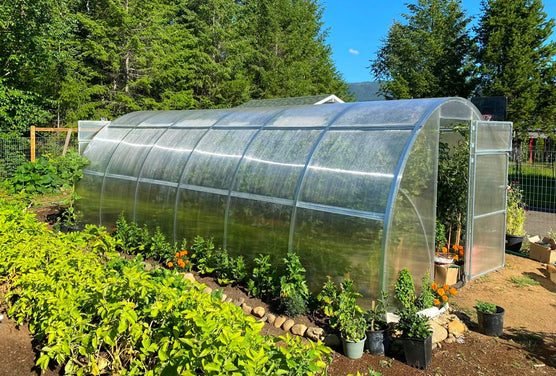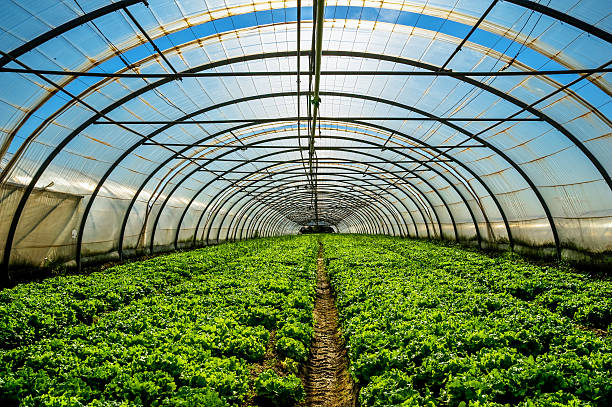Tailored to Perfection: Monarch Custom Greenhouse Utah Craftsmanship
Wiki Article
Greenhouse Farming: Making The Most Of Crop Returns and Sustainability
With regulated settings and minimized water usage, greenhouse farming uses the perfect service for year-round manufacturing of fresh produce. Discover the benefits of greenhouse farming and start enjoying the benefits today!Benefits of Greenhouse Farming
Are you wondering what makes greenhouse farming so advantageous? Well, allow me tell you! Among the major benefits of greenhouse farming is the capacity to manage the setting in which crops are expanded. With a greenhouse, you can adjust aspects like light, temperature level, and moisture to maximize plant growth. This indicates that you can grow crops throughout the year, despite the climate condition outside.One more advantage of greenhouse farming is the decrease in water use. Greenhouses are created to be water-efficient, with systems that reuse and record water, reducing wastage. This is specifically important in locations where water scarcity is a concern. By utilizing water more efficiently, greenhouse farming helps to preserve this valuable source.
Additionally, greenhouse farming permits for better parasite and disease monitoring. With the controlled atmosphere, it is simpler to protect against and control the spread of conditions and parasites. This minimizes the demand for dangerous pesticides, making greenhouse-grown plants much safer and much more environmentally pleasant.
Additionally, greenhouse farming supplies defense against extreme weather condition occasions. Plants grown in greenhouses are protected from hefty rainfall, solid winds, and hailstorms, which can damage or ruin exterior crops. Monarch Greenhouse construction Utah. This security makes sure an extra stable and trustworthy crop yield, even during uncertain climate conditions

Making The Most Of Crop Yields With Managed Atmospheres
To optimize plant yields in greenhouse farming, you can achieve optimal outcomes by regulating the setting. By very carefully handling elements such as temperature, carbon, moisture, and light dioxide levels, you can develop the excellent problems for your crops to grow. Among the essential advantages of greenhouse farming is the capacity to control these environmental elements, allowing you to customize them to the details requirements of each crop. As an example, you can change the temperature level to advertise faster growth throughout the day and reduced it somewhat in the evening to resemble natural fluctuations. You can control moisture levels to protect against illness and guarantee proper transpiration. By providing the best quantity and high quality of light, you can extend the expanding period and increase returns. Additionally, by managing co2 levels, you can improve photosynthesis and urge vigorous development. By implementing these managed settings, you can optimize crop yields and accomplish regular, premium fruit and vegetables throughout the year.Encouraging Sustainability Through Greenhouse Farming
Make best use of sustainability in greenhouse farming by executing effective resource administration strategies. One key facet of promoting sustainability is the monitoring of water usage. By carrying out systems such as drip irrigation and recirculation, you can substantially lower water wastefulness and guarantee that every decline counts. Furthermore, utilizing organic and biodegradable materials for insect control and fertilization can help minimize environmental influence. Integrated Bug Administration (IPM) methods, for instance, involve using advantageous insects to control pests, decreasing the requirement for damaging pesticides. Power usage can be minimized by using sustainable energy resources, such as solar panels, to power greenhouse procedures. This not only decreases dependence on nonrenewable fuel sources but additionally lowers greenhouse gas emissions. Proper waste management is another critical component in promoting sustainability. Carrying out recycling and composting systems can decrease the amount of waste sent out to garbage dumps while also supplying nutrient-rich compost for plant development. Incorporating lasting practices in greenhouse style, such as making use of energy-efficient materials and maximizing natural illumination, can better enhance sustainability. By taking on these source management methods, you can add to a much more lasting future in greenhouse farming.Decreasing Water Use in Greenhouse Farming
By applying effective water management techniques, you can considerably reduce water usage in greenhouse farming. Additionally, surveillance and controlling the moisture levels inside the greenhouse can prevent unnecessary water loss. By taking on these water-saving methods, you can decrease water waste, conserve sources, and develop a more lasting future for greenhouse farming.Year-Round Production of Fresh Create in Greenhouses
You can achieve year-round production of fresh fruit and vegetables in greenhouses by carrying out reliable growing strategies. Greenhouses provide a controlled setting that allows you to grow plants no matter the external weather condition problems. One vital technique for year-round production is making use of synthetic lights. By supplementing natural sunlight with man-made light, you can expand the growing period and make sure consistent growth throughout the year. Due to the fact that they are energy-efficient and give turf grass for sale the right spectrum of light for plant growth, led lights are typically made use of in greenhouses. Furthermore, correct temperature control is critical for year-round manufacturing. Greenhouses can be outfitted with home heating and cooling down systems to keep optimum temperature levels for various plants. This makes certain that plants can grow also throughout the chillier months. One more essential element is irrigation. By using advanced irrigation systems such as drip watering or hydroponics, you can successfully give water to your plants while decreasing waste. Lastly, it is important to consistently monitor and take care of parasites and conditions. Executing integrated parasite administration methods and practicing good health will help safeguard your plants and keep their health and wellness throughout the year. By carrying out these methods, you can make best use of the efficiency of your greenhouse and delight in a steady supply of fresh generate all year long.
Conclusion
To conclude, greenhouse farming supplies various advantages for optimizing crop returns and advertising sustainability. By utilizing controlled settings, farmers can optimize expanding problems and enhance performance. Furthermore, greenhouse farming permits for reduced water usage, making it an eco friendly option. In addition, the ability to produce fresh fruit winter lawn care and vegetables year-round in greenhouses ensures a stable supply of nourishing food. In general, greenhouse farming is a effective and lasting technique for satisfying the demands of a growing populace while reducing environmental effect.One of the major advantages of greenhouse farming is the capacity to manage the environment in which plants are expanded.To make best use of plant yields in greenhouse farming, you can achieve optimum results by controlling the setting. One of the vital benefits of greenhouse farming is the capability to regulate these environmental elements, allowing you to tailor them to find out here now the specific demands of each crop.By executing efficient water monitoring methods, you can considerably reduce water use in greenhouse farming.In conclusion, greenhouse farming gives many advantages for maximizing plant yields and advertising sustainability.
Report this wiki page